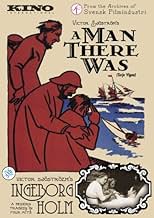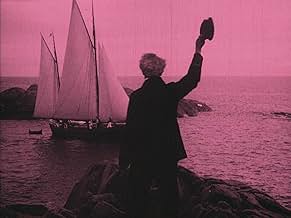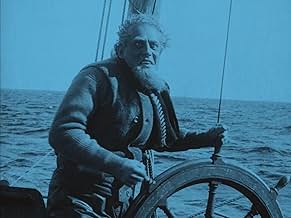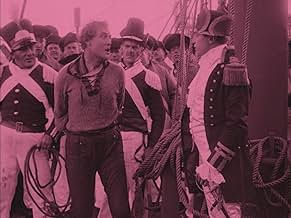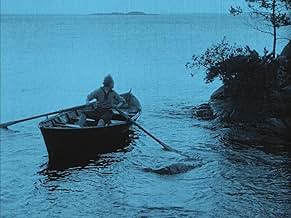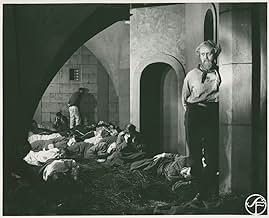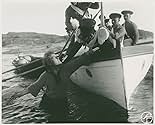IMDb RATING
7.3/10
2.5K
YOUR RATING
Terje Vigen, a sailor, suffers the loss of his family through the cruelty of another man. Years later, when his enemy's family finds itself dependent on Terje's beneficence, Terje must decid... Read allTerje Vigen, a sailor, suffers the loss of his family through the cruelty of another man. Years later, when his enemy's family finds itself dependent on Terje's beneficence, Terje must decide whether to avenge himself.Terje Vigen, a sailor, suffers the loss of his family through the cruelty of another man. Years later, when his enemy's family finds itself dependent on Terje's beneficence, Terje must decide whether to avenge himself.
- Director
- Writers
- Stars
Eric Abrahamsson
- En fiskare
- (uncredited)
Hildur Carlberg
- En kvinna i byn
- (uncredited)
Gucken Cederborg
- Den nya hustrun i Terjes stuga
- (uncredited)
John Ekman
- Norsk fånge i fängelset
- (uncredited)
Nils Elffors
- En av Terjes kamrater (1)
- (uncredited)
Emil Fjellström
- En fiskare på stranden
- (uncredited)
Julius Hälsig
- Engelsk officer i fängelset
- (uncredited)
Herman Lantz
- En av Terjes kamrater (2)
- (uncredited)
William Larsson
- Den nye mannen i Terjes stuga
- (uncredited)
- …
Gunnar Norberg
- Self
- (uncredited)
Hans Sjöblom
- En liten pojke
- (uncredited)
Nanny Sjöblom
- Mor med son i knäet
- (uncredited)
Fritz Ström
- Vitskäggig gammal gubbe
- (uncredited)
Jenny Tschernichin-Larsson
- En kvinna på stranden
- (uncredited)
- Director
- Writers
- All cast & crew
- Production, box office & more at IMDbPro
Featured reviews
A Man There Was tells the story of Terge Vigen, a Swedish seaman played by director Victor Sjöström who plucks up the courage to take on the British Empire's naval blockade of trade routes which in turn is slowly starving out his small village, wife and child. Set mostly amid the chaotic northern sea and coastlines, Sjöström creates a wonderfully moody and sombre atmosphere throughout filled with strife and tension, an impressive and fitting soundtrack (on the 2008 DVD version), distilled by beautiful intertitles taken from a Henrik Ibsen poem. Although it has its moments and overall is an enjoyable feature, its short runtime, sometimes plodding pacing and lack of significant plotting stop the movie from ever truly taking off beyond being a mere mood piece.
Terje Vigen (1917) directed by and starring the father of Swedish cinema, Victor Sjöström, is a true masterpiece of early cinema.
The story is simple and revolves around Terje Vigen, a sailor, who suffers the loss of his family through the cruelty of another man. Years later, when his enemy's family finds itself dependent on Terje's beneficence, Terje then must decide whether to avenge himself.
When comparing Terje Vigen to its peer films of the 1910's such as L'Inferno (1911), From the Manger to the Cross (1912), The Straw Man (1914), Birth of a Nation (1915) and even the masterful Intolerance (1916), what stands out in Sjöström's film making is it's emotional impact rather than its production design or acting prowess. It is a mature depiction of human pain, suffering and redemption, that far succeeds its historical immaturity. Also particularly noteworthy is Rodulf Sahlberg's amazing score for the film.
Ii highly recommended it for film buffs and those interested in cinema history. Victor Sjöström's protegé, Ingmar Bergman would continue the beginning of the Swedish film making legacy in becoming one of cinema history's most revered directors.
The story is simple and revolves around Terje Vigen, a sailor, who suffers the loss of his family through the cruelty of another man. Years later, when his enemy's family finds itself dependent on Terje's beneficence, Terje then must decide whether to avenge himself.
When comparing Terje Vigen to its peer films of the 1910's such as L'Inferno (1911), From the Manger to the Cross (1912), The Straw Man (1914), Birth of a Nation (1915) and even the masterful Intolerance (1916), what stands out in Sjöström's film making is it's emotional impact rather than its production design or acting prowess. It is a mature depiction of human pain, suffering and redemption, that far succeeds its historical immaturity. Also particularly noteworthy is Rodulf Sahlberg's amazing score for the film.
Ii highly recommended it for film buffs and those interested in cinema history. Victor Sjöström's protegé, Ingmar Bergman would continue the beginning of the Swedish film making legacy in becoming one of cinema history's most revered directors.
Terje Vigen / A Man There Was (1917) :
Brief Review -
Victor Sjöström Gives Birth to an undying formula of Forgiveness over Vengeance in the most expensive Swedish film of its time. "Ingeborg Holm" (1913) by Victor Sjöström had a huge impact on the Swedish audience as well as foreign audiences who were underestimating Swedish films at the time. With Terje Vigen, he made the most expensive Swedish film of the time and apparently kicked off the golden era for Swedish cinema. I have witnessed this compassionate formula of "forgiveness" in many movies made in the last 10 decades, including a film made in 2022. Recently, there was a Bollywood film called "Jalsa", which used the same formula, while the most acclaimed works based on the same formula in the past few years had to be "Rubaru Roshni" (2019) and "Kaanekkaane" (2021). Knowing Terje Vigen has set the formula is nothing less than a blessing. I mean, I can't name all those hundreds of films that used the same formula in this brief write-up, but come on, how can they all be termed great for copying it from an old, unknown film? So let's give credit where it's due. The film is about Terje, a sailor who suffers the loss of his wife and kid during the Napoleonic Wars of 1809. He is captured by a brutal British officer, which changes his life forever and leaves him all alone in the world. Will he get his revenge? That's where the kick is. I won't spoil it, but I guess you already know it. Victor Sjöström's trendsetter drama is full of life, tragedy, drama, and conflicts, and all are relatable. You can find yourself in Terje, especially when you assume it's anything before the 21st century. Apart from pioneering dramatic conflicts, Terje Vigen also set benchmarks for big-scale movie making at that time. Overall, another great film in Master Victor Sjöström's filmography.
RATING - 7.5/10*
By - #samthebestest.
Victor Sjöström Gives Birth to an undying formula of Forgiveness over Vengeance in the most expensive Swedish film of its time. "Ingeborg Holm" (1913) by Victor Sjöström had a huge impact on the Swedish audience as well as foreign audiences who were underestimating Swedish films at the time. With Terje Vigen, he made the most expensive Swedish film of the time and apparently kicked off the golden era for Swedish cinema. I have witnessed this compassionate formula of "forgiveness" in many movies made in the last 10 decades, including a film made in 2022. Recently, there was a Bollywood film called "Jalsa", which used the same formula, while the most acclaimed works based on the same formula in the past few years had to be "Rubaru Roshni" (2019) and "Kaanekkaane" (2021). Knowing Terje Vigen has set the formula is nothing less than a blessing. I mean, I can't name all those hundreds of films that used the same formula in this brief write-up, but come on, how can they all be termed great for copying it from an old, unknown film? So let's give credit where it's due. The film is about Terje, a sailor who suffers the loss of his wife and kid during the Napoleonic Wars of 1809. He is captured by a brutal British officer, which changes his life forever and leaves him all alone in the world. Will he get his revenge? That's where the kick is. I won't spoil it, but I guess you already know it. Victor Sjöström's trendsetter drama is full of life, tragedy, drama, and conflicts, and all are relatable. You can find yourself in Terje, especially when you assume it's anything before the 21st century. Apart from pioneering dramatic conflicts, Terje Vigen also set benchmarks for big-scale movie making at that time. Overall, another great film in Master Victor Sjöström's filmography.
RATING - 7.5/10*
By - #samthebestest.
For students of film, this is a must-see. Sjostrom proved to be highly influential in the development of Scandanavian and Northern European film. His output was prolific, but TERJE VIGEN is one of my favorites-- it captures well the angst and anxiety so pregnant among Scandanavian and Danish masters (Dreyer and Bergman come to mind as spiritual successors/contemporaries of Sjostrom). TERJE VIGEN, in particular, is one of those stories that will haunt but also reward. The cinematography is what one would expect of a film that is literally more than 100 years old-- innovative for its time, it is very subtle. Where this film really shines is in the phenomenal acting, especially by Sjostrom himself.
This is a faithful adaptation of the eponymous poem by Henrik Ibsen, and all inter-titles are quotations of Ibsen's original text. The film follows an innovative non chronological structure. In the brief opening scene, old grey-haired Terje Vigen is contemplating a stormy sea. It is followed by a long flash back showing his past life first with his wife and daughter, his trip to Denmark, his capture by the English, his life as prisoner in England, and finally his return home. There is even a flashback in the flashback when, while in jail, Terje Vigen remembers his wife and daughter. The last part starts with the same scene as the opening one, followed by the rescue of the British yacht. It is interrupted by a brief flashback when Terje Vigen realises the Captain of the yacht is the Englishman who had taken him prisoner. The most remarkable aspect of the film is the outdoor on-location filming on the coast and on small boats, which gives great authenticity to the action, in particular the very realistic chase and sinking of the dinghy in the middle of reefs. Editing is brisk, cross-cutting between views of the two boats and then between the English boat and Terje Vigen trying to escape by swimming underwater.
See more and a link to the full film at: a-cinema-history.blogspot.com/2013/12
See more and a link to the full film at: a-cinema-history.blogspot.com/2013/12
Did you know
- GoofsA title card references the year of the blockade as 1809. Great Britain and Sweden were allies in 1809, so there was no blockade. However, after she was forced to make peace with France after losing The Finnish War and the Pomeranian War, Sweden declared war against Great Britain. The Anglo-Swedish War (1810-1812) existed only on paper: British ships were still allowed to dock on the island of Hanö and trade with the Baltic states. Great Britain blockaded Sweden during World War I.
- Quotes
[first lines]
Title Card: On a barren, remote islet, there lived an odd, grizzled man.
- ConnectionsEdited into Spisok korabley (2008)
Details
Box office
- Budget
- SEK 60,000 (estimated)
- Runtime
- 1h 5m(65 min)
- Color
- Sound mix
- Aspect ratio
- 1.33 : 1
Contribute to this page
Suggest an edit or add missing content

